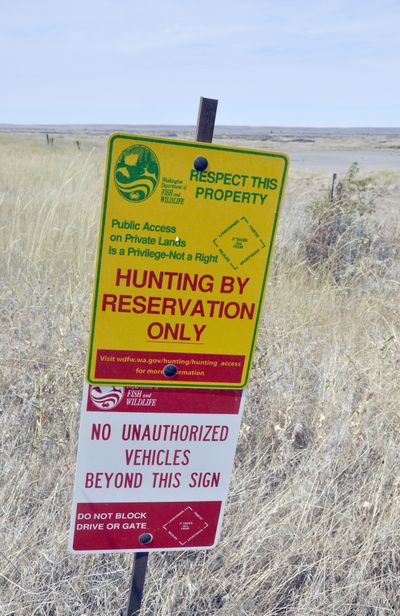Landers: Hunters will have to RSVP for privately owned spots

Some sportsmen will have reservations about a new online hunting access program in Eastern Washington this season. Others will log-in to the possibilities.
The Washington Department of Fish and Wildlife has tapped a federal Farm Bill program for $1.5 million to fund a “Hunt by Reservation” system for access to designated private lands.
Hunters must compete online to reserve a limited number of 2- to 3-day hunting slots on properties ranging from a few hundred to a few thousand acres.
Landowners enrolled in the program are paid $3-$5 an acre for allowing hunter access and agreeing to wildlife habitat improvements.
So far, 67 properties totaling about 50,000 acres in five counties have been enrolled, with 54 of those properties in Whitman County. More contracts are pending.
Hunt by Reservation joins the following established access programs:
• Register to Hunt, with about 20,000 acres in 6 counties.
• Landowner Hunting Permit, with about 150,000 acres in 7 counties.
• Feel Free to Hunt, with about 540,000 acres in 27 counties.
• Hunt by Written Permission, with about 560,000 acres in 21 counties.
Listings for the various programs are still being updated on the WDFW website.
The Hunt by Reservation system was supposed to kick off last year but software and inputting issues put it on hold until this spring, when a few turkey hunters booked the first hunts.
Archery hunters currently are taking advantage of the system. Youth and senior seasons have slots that will open for “reservation attempts” starting three weeks before the designated hunts.
The federal grants have helped beef up the state’s private lands program to bridge the gap between sportsmen and landowners while improving habitat.
Joey McCanna has been named private lands-conflict supervisor. He was orienting a new hire in the Spokane Region last week, bringing the program staff to four in the 10 counties of Region 1. This staff deals with everything from hunting-fishing access to big-game damage on crops and even wolf depredation.
Recently, they’ve been focused on Hunt by Reservation, working daily to get area boundaries posted, McCanna said. Landowners, who have access to the list of hunters reserving access to their property on designated dates, enjoy the freedom of not being personally contacted, McCanna said.
Hunters should print out maps showing boundaries of their reservation area and carry the maps for reference in the field.
McCanna offers these answers to the most common questions hunters are asking about the new Hunt by Reservation program:
• Names of the properties correspond to a road they border.
• Reservations can be made no sooner than midnight three weeks in advance of 2- to 3-day designated hunting slots.
• Hunters must park vehicles at designated access points.
• Some group reservations give 2-4 hunters exclusive access to a property for a hunting slot. If one hunter scores a reservation, the others must sign onto it.
• Some individual reservations for large properties may put up to four unconnected hunters on the same land at one time, such as in the case of archery deer hunts. In those cases, each hunter should use a different parking access point, first-come, first-served.
• A hunter is allowed to have no more than three reservations in his name at a time. A hunter with three reservations is eligible to sign up for another slot when one of those reservations expires.
• The number of hunts is limited on each property with a no-hunting gap in between to provide rest days for wildlife and a better chance for a quality hunting experience.
• The term “quality hunt” has no relationship to the “quality tag” category for deer and elk permits. Hunters with reservations can use any tag valid for the time and area of their hunt.
• Special restrictions are listed for each property. Use of motor vehicles generally is prohibited.
• Reservations are not transferrable.
• A hunter can cancel a reservation up to a week prior to the hunt, making it available for other hunters.
Most of the properties in the Hunt by Reservation program have good wildlife habitats, McCanna said. Some are better than others. Some are being improved.
Habitat work accomplished so far on about 3,500 acres in the program includes planting legumes in CRP fields to boost habitat for upland birds based on research McCanna conducted in recent years.
“A lot of these properties already have habitat including eyebrows and thermal cover,” he said. “We’re concentrating on getting more diversity out there for the game birds, especially the spring chicks, but it also provides food for deer.”
WDFW is leveraging its grant money by working with federal Farm Service and Natural Resources Conservation agencies. “When we can tie a project to their projects we can double the acreage of habitat improvement in some cases,” McCanna said.
Hunt by Reservation is subject to the heartburn associated with cyberspace. Maps are slow to download. Will the site crash when a slug of hunters pounces on the Net the moment reservations start for the pheasant season opener?
In some cases, the state has undermined hunters who had permission to hunt these properties.
But most sportsmen will applaud a program that offers landowners incentives to preserve wildlife habitat and provide the public a place to hunt.
Contact Rich Landers at (509) 459-5508 or email richl@spokesman.com.